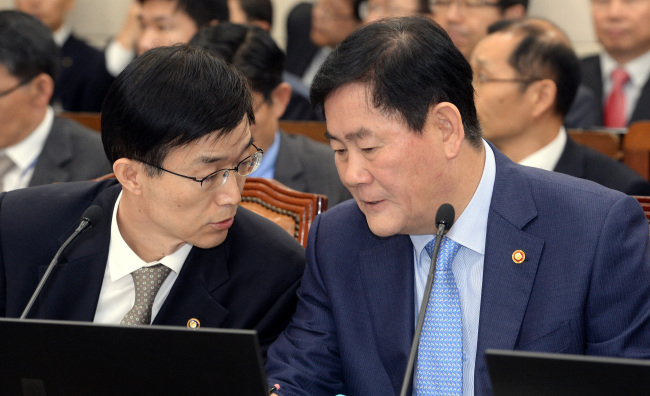 |
Finance Minister Choi Kyung-hwan (right) discusses key economic issues with his deputy during an audit on the ministry’s fiscal policies at the National Assembly in Seoul on Monday. (Ahn Hoon/The Korea Herald) |
The government is seeking to reduce expenditure as its tax revenue shortfall is expected to surpass 10 trillion won ($95 billion) this year, according to a report published by the National Assembly Budget Office last week.
The shortfall is forecast at 10.7 trillion won, as this year’s tax revenues were expected to stand at 205.7 trillion won, down 5 percent from the 216. 5 trillion won forecast issued by the government in 2013.
Next year, the shortfall will stand at around 4.4 trillion won, based on the budget office’s forecasts that the nation’s economic growth would be 3.8 percent, lower than the government-projected 4 percent.
To help cope with the shortfalls, the Finance Ministry has been undertaking cost-cutting measures, reportedly telling each ministry to review their the current budget situations, and recommending them to delay spending on low-priority projects.
President Park Geun-hye also reportedly told ministers at the unofficial meeting last Wednesday that as tax revenues are falling more than expected, budget planning and implementation should become more streamlined.
The report cited poor performance in the local corporate sector, a prolonged economic downturn, low inflation and weakened consumer confidence stemming from the sinking of the Sewol ferry in April as the causes behind the faltering revenue figure.
Noting the discrepancy between last year’s projections and the actual amount to be collected this year, experts said the government needs to be less optimistic when it comes to estimating tax revenues.
“Next year’s tax revenue estimate appear to be more realistic than this year’s, but it still appears to be too optimistic as Korea’s economy is far from being stable,” said Kang Byung-koo, an economics professor at Inha University.
The government has pulled out all stops to help revive the economy, including a significant stimulus plan, coupled with relaxed mortgage regulations and tax breaks on dividends and for companies that invest more in their businesses. The Finance Ministry also has decided to push up cigarette prices to rake in more tax revenue.
The central bank, too, has been offering stimulus by cutting the key interest rate on two occasions this year to a record-low 2 percent.
But chronically weak domestic demand combined with a continually heavy reliance on exports are taking a toll on the nation’s economy, industry watchers said.
To make up for the tax revenue shortfall, Kang said the government should shift its tax base from middle-and low-income groups to high-income groups.
“The nation needs to reduce levying indirect taxes such as tobacco, residence and vehicle taxes, which are a burden to middle- and low-income groups. Instead, it should collect more taxes on property or financial assets from high-income groups.”
By Shin Ji-hye (
shinjh@heraldcorp.com)








